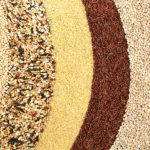By David Blyweiss, M.D., Advanced Natural Wellness
April 25, 2018
- Is fiber the latest anti-aging treatment?
- Take up to 6 years off your biological age
- Here’s how easy it is to slow down the aging process
Did you know that if you aren’t eating enough fiber you might be aging more quickly than your peers? Sure, you might be the same age chronologically. But biologically you may look older, feel older and have more health problems.
You see, it turns out that people with a high fiber intake have longer telomeres than people who eat diets low in fiber.
If you aren’t familiar with them, telomeres are segments of DNA at the end of our chromosomes that control aging. If your telomeres are shorter than average, it increases your chances of developing age-related diseases such as cancer, diabetes, heart disease and dementia are increased. Shorter telomeres also mean a reduced lifespan.
Longer telomeres, on the other hand, are associated with a long and robust lifetime.
So just how amazing is it to discover that every gram of fiber you eat on a daily basis could reduce telomere shortening?
Take up to 6 Years off Your Biological Age
Most Americans are eating about less than half of the fiber they need to maintain good health… about 6.6 grams of fiber per 1000 calories.
But guess what? Each 10 gram increment in fiber intake for every 1000 calories you eat can increase the length of your telomeres. You can literally reduce biological and cellular aging by five or six years. (Conversely, for every gram of fiber you don’t eat, your telomeres lose length.)
In other words, you can slow down your cellular time-clock and put the brakes on aging just by eating more fiber-rich foods.
But here’s the thing.
Eating a bowl of whole grain cereal for breakfast… maybe a sandwich on whole-grain bread for lunch… isn’t going to meet your fiber needs. In fact, grains are not highest – nor are they the healthiest – source of fiber in your diet.
That’s because today’s whole grains aren’t anything like nature intended. Unless they’re original actual ancient grains. The grains we eat today are not the grains we ate yesteryear. They’ve been scientifically engineered and hybridized. And most of them contain gluten, which often triggers inflammation. Your body simply isn’t designed for them.
Are You Suffering From...
- Love handles and a pot belly
- Romance that isn't what it used to
- Forgetfulness and inattention
- Low (or no) strength and endurance
- A sex drive that's shifted into neutral...or worse
If so...you may have Mature Male Burnout. Click here to discover more about this unique condition and what you can do about it.
That being said, there are many healthier foods that often contain a lot more fiber than whole grain cereals and breads.
Here’s how Amazingly Simple it is to Slow down the Aging Process
Lentils, beans and other legumes are great sources of fiber. You’ll find a hefty 15 or more grams of fiber in a single cup of cooked lentils, black beans or split peas. Chickpeas, lima beans, navy beans… all of them are extremely high in fiber. Plus, they come with many other health benefits you may be unaware of. (You should check out what else eating more beans can do for you!)
Avocados, artichokes and green peas all have a high fiber content. Brussels sprouts, turnip greens, broccoli and acorn squash can also contribute to your daily fiber intake.
I also recommend eating berries of all kinds to add more fiber to your diet, especially blackberries, raspberries and blueberries. If you’re not fond of berries, coconut, pears, apples, apricots and figs also contain appreciable amounts of fiber.
And don’t forget your nuts and seeds. Pumpkin seeds, almonds, sesame seeds, pistachios, hazelnuts and others can all be added to your diet for increased fiber intake.
On a final note…
Telomere extension is a hot topic these days. Scientists are scrambling to discover gene therapies, drugs and other treatments that can lengthen telomeres, delay aging, and slow down the development of age-related diseases.
Maybe they’ll succeed. Maybe they won’t. In the meantime, it’s nice to know that you can take matters into your own hands with something as simple as adding an abundance of healthy high fiber foods to your diet.
SOURCES:
Tucker LA. Dietary Fiber and Telomere Length in 5674 U.S. Adults: An NHANES Study of Biological Aging. Nutrients. 2018 Mar 23;10(4). pii: E400.
USDA Food Composition Database. United States Department of Agriculture
Agricultural Research Service.







